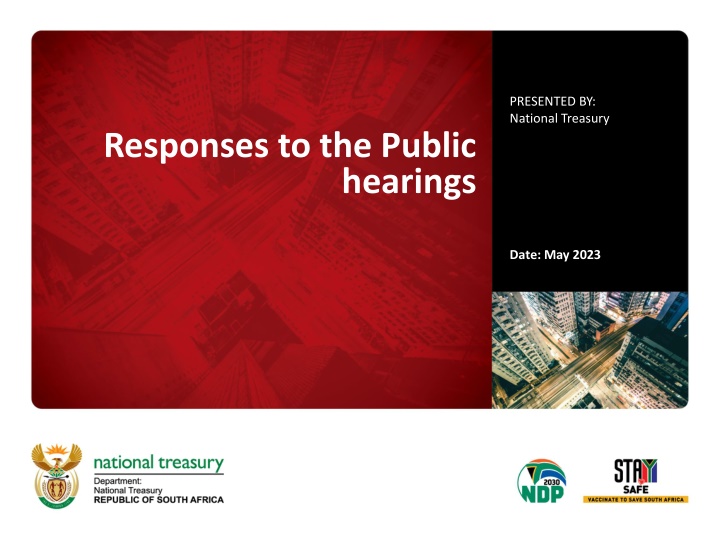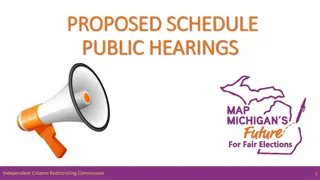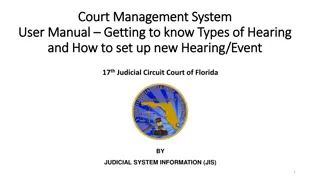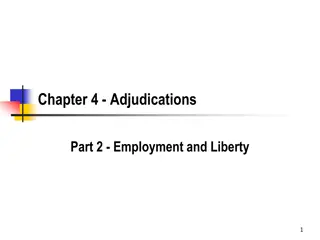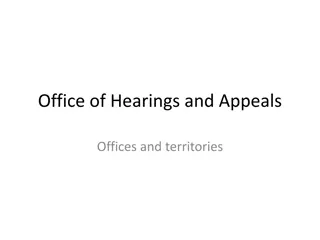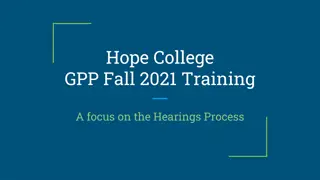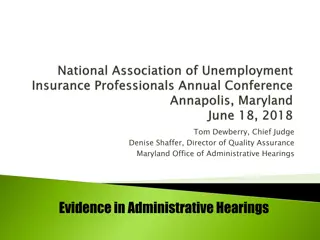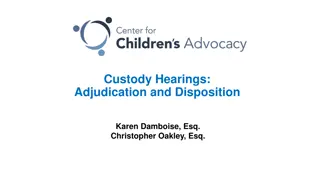National Treasury Responses to Public Hearings - Cross-Cutting Issues Update
National Treasury responds to key cross-cutting issues from public hearings, addressing matters such as additional funding for programs, accountability, corruption, single wage regime, and reduction of politicians' and managers' packages. The Treasury outlines its actions and plans for each issue to enhance transparency and efficiency in government operations.
Download Presentation

Please find below an Image/Link to download the presentation.
The content on the website is provided AS IS for your information and personal use only. It may not be sold, licensed, or shared on other websites without obtaining consent from the author.If you encounter any issues during the download, it is possible that the publisher has removed the file from their server.
You are allowed to download the files provided on this website for personal or commercial use, subject to the condition that they are used lawfully. All files are the property of their respective owners.
The content on the website is provided AS IS for your information and personal use only. It may not be sold, licensed, or shared on other websites without obtaining consent from the author.
E N D
Presentation Transcript
PRESENTED BY: National Treasury Responses to the Public hearings Date: May 2023
2 Cross cutting issues Issue Presidential youth intervention Additional funding for different programmes National Treasury's Response Recommendation is noted and it will be presented and considered in the budget process commencing in June to be presented in October Recommendation is noted and it will be presented and considered in the budget process commencing in June to be presented in October Accountability by different departments Recommendations noted Corruption and wasteful expenditure Funding was allocated to different entities to fight corruption Need single wage regime & collective bargaining processes for national, provincial, SOEs & entities. NT is in agreement. The public sector remuneration review project is currently underway which is led by the DPSA, working with various stakeholder including the National Treasury. The idea is for the public sector (excluding State-owned companies) to move towards a single remuneration framework that would regulate all government employees under a single framework which may ultimately result in equitable remuneration levels across government. This would also eliminate the current disparities that exists amongst the various bargaining councils which has unintentionally created undue tensions and unrest amongst various government employees during their wage negotiation processes
3 Cross cutting issues Issue National Treasury's Response Reduce politicians & managers packages required by section 219 of the Constitution. National Treasury does make submissions to the Commission and the President expressing its views on the recommendations. With regards to other benefits, the Guide for Members of the Executive (Ministerial Handbook) is currently under review and the DPSA is leading the process. The National Treasury has managed to contain the price threshold of official vehicles static at around R800 000 since 2019 as a way of managing and restraining expenditure relating to benefits of the Executive INDEPENDENT COMMISSION FOR THE REMUNERATION OF PUBLIC OFFICE- BEARERS ACT, 1997 establishes an independent commission (Independent Commission for the Remuneration of Public Office-bearers) to make recommendations to the President concerning the salaries, allowances and benefits of office-bearers as National Treasury agrees that remuneration for managers in some state-owned entities need to be reviewed and will be working with other stakeholders such as the DPSA to embark on this exercise as part of the single public sector remuneration framework. However, for managers in the public service and local government, remuneration and packages are linked to those of the employees in the bargaining councils. Reduction in their salaries would need to be linked to an overall review of the entire remuneration structures. Over the years, government has been struggling to deal with the overlaps in wage gaps between collective bargaining employees and senior managers. Therefore, a reduction in their salaries without reviewing the bargaining council employees remuneration would result in overlap of non-senior managers salaries and a potential skills depletion in that cohort.
4 Cross cutting issues Issue National Treasury's Response Physical headcount for ghost posts. and it doesn t seem like there were major problems detected. National treasury agrees that a PERSAL clean up should be prioritised and is engaging with the DPSA on how such a project can be initiated. However, in some provinces such as KwaZulu-Natal, Limpopo and Gauteng, such initiatives were implemented in the past
5 Justice and protection services Stakeholder Issue Public Service Accountabilit y Monitor ensure adequate resourcing of anti- corruption system? National Treasury's Response Funds can be reallocated/reprioritised both within or outside the Justice vote. For example, R33 million was reprioritized towards the implementation of the FATF recommendation to be implemented by the Financial Intelligence Centre. In addition, NPA was allocated an additional amount of R1.3 billion mainly for the implementation of the State Capture Commission recommendations NT supports the current funding model. SIU receives a government grant and charges state institutions for investigations rendered. At the end of March 2022, R921.2m surplus funds were approved by NT for the SIU to retain in 2022/23 FY. In Budget 2023, an additional R100m was allocated to SIU to initiate civil litigation linked to the recommendations of the State Capture Commission. Regarding DoJCD underspending, the SIU has an option to request the department to increase its transfer payment. The recommendation is noted. However, it should be noted that the bulk of the work is done by relevant government departments responsible for the implementation of the various pillars of the NACS, (e.g DoJCD, SAPS, DPSA, CoGTA and NT etc). Should a need for additional funding arise, this will be dealt with as part of the budget process. Can funds be reallocated within the Justice Vote to Compel NT to review SIU funding model to ensure it is fully funded and able to deliver on its mandate. Given underspending by DoJCD, reallocate funds to SIU Ensure NACAC receives adequate funding to ensure sustainability. [funded from CARA only.]
6 Justice and protection services Stakeholder Issues National response Additional R7.8 billion allocated over the next three years to appoint a total of 15 000 police trainees and as a result police numbers are set to increase from 178 708 in 2022/23 to 193 708 in 2025/26 Treasury s Headcount decline from 208 000 to 172 000 personnel over 2 decades and inadequate working tools in police stations to fix the crime situation Congress of South African Trade Unions (COSATU)
7 Education and related sectors Stakehold er Issue NT Response National Treasury to adopt a human rights approach to budgeting that prioritises socio- economic rights like basic education Higher Education is allocated 3 times as much as Basic Education Over 60% of total non-interest spending is allocated over the MTEF to community development, employment programmes, health, education and social protection - an indication that the Budget does priorities socio-economic issues. Equal Education The Appropriation Bill only reflects proposed allocation to national departments. Higher Education and Training's proposed allocation is R110.8 billion for 2023/24 and that of Basic Education is R31.8 billion. However basic education is mainly delivered by the 9 provincial departments education and their total proposed allocation is R277.8 billion for 2023/24. Spending per learner in higher education is R64 8000 per student which is roughly 3 times more that that of basic education at R22 502 per learner. That is not unusual as one can understand that it would cost more to train a doctor, engineer or motor mechanic than it would to run a school programme. SeCoA COSATU CCMA struggling with case backlogs, yet its budget has not increased much to keep up with the increased demand. R120 million was allocated to the CCMA over the 2022 MTEF to assist with dispute resolutions and increasing caseload. The proposed transfer to the CCMA for 2023/24 is R1.05 billion.
8 Urban Development and infrastructure Stakeholder Issue Response Historic underspending on personnel in the department meant that the department was always able to cover its costs. With high vacancy rates, capacity was augmented through the consultants budget and will need to be rebalanced as the department s structure is filled. Department of Water and Sanitation Department of Communicatio ns and Technologies Constraints in personnel expenditure The only provisions in the Appropriation Bill is for universal services obligations of approximately R500 million The provincial roads maintenance grant provides funding for visual condition assessments of roads. Depending on the classification of the roads and bridges, this done every 2 years, or every 3 years. Financial position of the South African Post Office Department of Transport Pothole repairs Re-tabling of the RABS Bill Supported Turn around plans are a key requirement when departments motivate for funding. The financial position that entities find themselves in is due to costs exceeding revenue. Part of turning around is aligning these two items. Where costs needs to be reduced and organisational structures needs to be realigned, SOCs must be allowed to do so. COSATU Recapitalisation of state owned companies must be accompanied by turnaround plans
9 Urban Development and infrastructure Stakeholder Issue Response Of the R903 billion infrastructure investment that the state is expecting to do over the 2023 MTEF period, a third is from public corporations such as Eskom and Transnet. Economic infrastructure to improve the supply side capacity in the economy is largely funded on the balance sheets of these entities. Declining shares of capital investment by local government is concerning, as conditional grants on subsidises some of the investment, where surpluses in trading services are used elsewhere, which is concerning. Asset management is a key mechanism, together with life cycle costing to ensure that infrastructure is sustainably managed. FFC and Youth Capital Expanding infrastructure investment
10 Administrative services Stakeholder Issue The reduction of 0,8% in the baseline of the Department that could impact of service delivery. National Treasury's Response We did not reduce the baseline for the department of Home affairs, but we did a function shift from the department to the Border Management Authority that explains the reduction in the baseline of the department. The Border Management Authority was incubated in the department for 3 years prior to the entity becoming independent The Border Management Authority was established as an as independent entity on 1 April 2023 Department of home Affairs Lack of staff to deliver frontline services to the public Lack of funding allocated to political parties other than the R200 million allocated through the Special Adjustment Appropriation Bill Political parties receive funding from parliament for constituency work in various areas. There is also funds in provinces that are being access by political parties in the provinces The Multi party Democracy Fund are being administered by the IEC, but did not success t attract much funding. The baselines for political parties are being evaluated on an annual basis to determine the shortfall of the funding and to develop recommendations for Cabinet to consider IEC political party funding
11 Health and Social Development Stakeholder Issue SRD grant should be made permanent, raised to food poverty line and linked to employment services and skills programmes National Treasury's Response Work on options to replace the SRD R350 grant are ongoing and will be presented as part of the MTBPS However making the SRD 350 grant permanent will require a permanent revenue stream and an increase in taxation. Raising it to 73% of the Food Poverty line could cost R130 billion per annum by 2030. This would require very large tax increases NT agrees the grant should be linked to work seeking, public employment programmes and skills acquisition. The Committee is requested to engage with the Portfolio Committees of Social Development and Labour to develop such proposals COSATU
12 Economic Services Stakeholder Issue Government needs to provide assurances that the money owed to the workers at DENEL will now be paid. more needs to be done by law enforcement to protect our railway infrastructure. National Treasury needs to support Eskom to reduce wasteful expenditure National Treasury's Response All outstanding salaries were paid off by end of October 2022 after Denel realised R992 million from the Denel Medical Benefit Trust Cosatu Government already collaborates with Transnet as part of the protection of critical infrastructure strategy NT will continue to work closely with Eskom and DPE to reduce wasteful expenditure Over the 2023 MTEF, the DTIC has budgeted R18.9 bn towards business incentive programmes. However, this is not limited to SMMES The government supports SMMEs through the TREP which is meant to support businesses in townships and rural areas, which has been allocated R2.8 billion over the MTEF. The government also supports SMMEs through the Blended Finance programme, meant to subsidise SMME s to acquire private sector funding, which was allocated R4.1 billion over the MTEF Government also provides significant tax incentives to businesses Youth Capital The government must increase the annual industrial financing budget to 2.5% of GDP with 1% directed towards SMMEs
13 Economic Services Stakeholder Youth Capital Issues The must lending targets (or quotas) lending intensive sectors and black SMMEs. A third disbursements must be to youth-owned enterprises. National Treasury s response No policy position has been set to impose bank lending quotas collaborates with the private sector to support industrial policy among others as in the case on masterplans, the loan guarantee scheme Government will be working with banks again on the bounce back guarantee scheme for energy Development finance institutions already prioritise lending to youth owned enterprises. However, the ratio needs to increase government introduce but government for to bank labour of DFI
